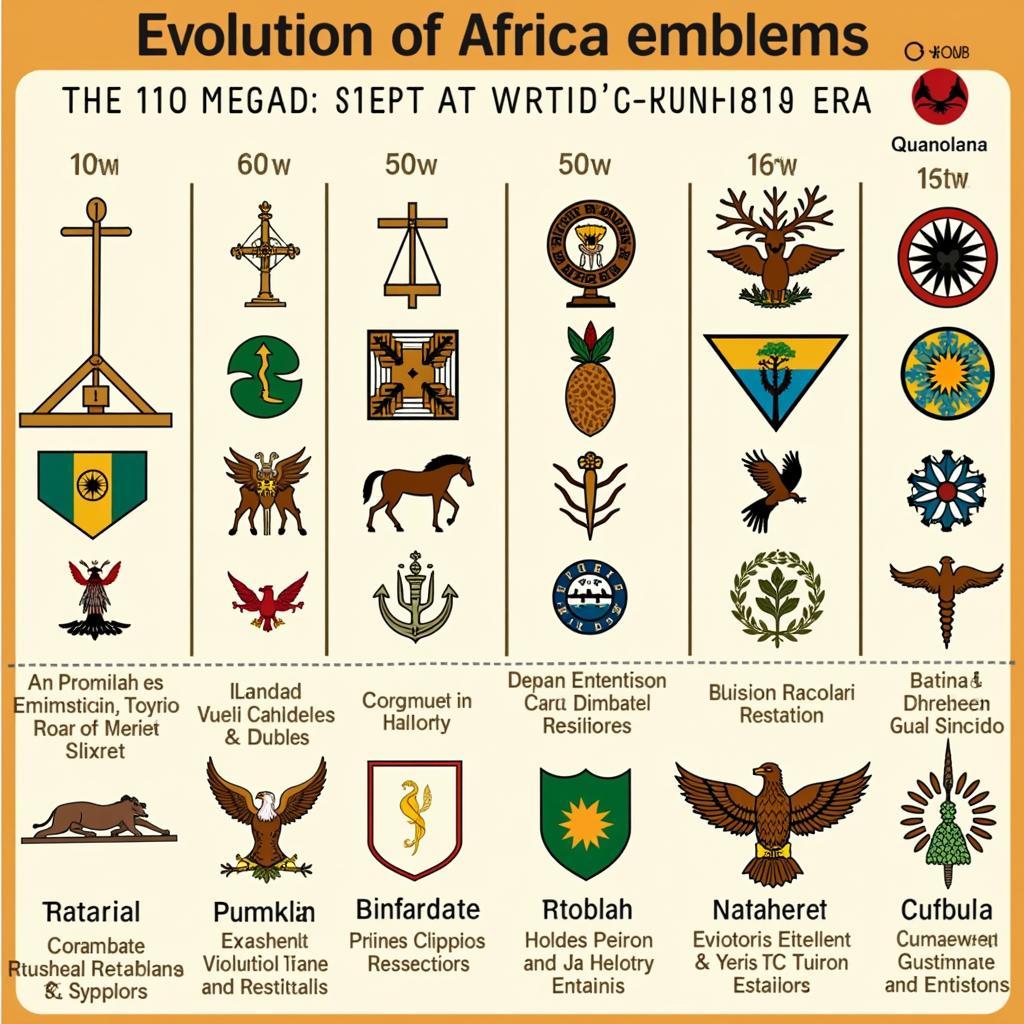Unveiling the Rich Tapestry of African Emblems
African emblems are more than just symbols; they are powerful expressions of culture, history, and identity woven into the very fabric of the continent’s diverse nations. They tell stories of ancient kingdoms, vibrant traditions, and the enduring spirit of Africa. From the majestic lion to the resilient baobab tree, these emblems embody the essence of each country, offering a glimpse into their unique heritage and aspirations.
Delving into the Significance of African Emblems
African emblems serve a multifaceted purpose, acting as visual representations of a nation’s values, beliefs, and aspirations. They are often deeply rooted in history, mythology, and folklore, reflecting the rich tapestry of cultural narratives that have shaped each country’s identity. These emblems can be found on national flags, coats of arms, currency, and other official insignia, solidifying their importance in national identity. They also appear in art, music, and literature, further embedding them into the cultural consciousness.
Understanding these emblems is crucial to appreciating the complex and nuanced history of Africa. They offer a window into the past, present, and future of each nation, highlighting their struggles, triumphs, and hopes. By exploring the symbolism behind these emblems, we can gain a deeper appreciation for the diversity and richness of African cultures.
Exploring the Variety of African Emblems: Animals, Plants, and Objects
African emblems showcase a remarkable diversity, drawing inspiration from the continent’s rich flora, fauna, and cultural artifacts. Majestic animals like the lion, representing strength and royalty, are prominent in many national emblems. The eagle, symbolizing freedom and vision, is another popular choice. Plants, such as the resilient baobab tree, often represent longevity and resilience, while agricultural products like cocoa or coffee beans highlight the importance of these resources to the nation’s economy. Objects like shields and spears, often incorporated into emblems, can symbolize protection and strength, reflecting a nation’s history of warfare or resilience. Each emblem is carefully chosen to represent the specific qualities and values a nation holds dear.
The selection of specific animals, plants, or objects often carries deep cultural significance, relating to traditional stories, beliefs, and practices. For instance, the fish eagle, appearing on the Zambian coat of arms, symbolizes the nation’s natural resources and its people’s ability to rise above challenges.
What is the purpose of an African emblem?
African emblems primarily serve to represent a nation’s identity, values, and history in a visual form. They are symbols of national pride and unity.
African Emblems and National Identity
African emblems play a vital role in fostering a sense of national identity and unity. They serve as rallying points, reminding citizens of their shared heritage and common goals. In newly independent nations, emblems were particularly crucial in forging a sense of nationhood after colonial rule. These symbols helped to differentiate the new nation from its colonial past and establish a distinct national identity.
Emblems also play a role in international relations, representing the nation on the global stage. They appear on passports, visas, and at international events, symbolizing the nation’s sovereignty and distinct identity.
How do African emblems reflect cultural values?
African emblems often reflect the core cultural values of a nation. These can include strength, resilience, unity, prosperity, and connection to the land. Each emblem tells a story.
The Evolution of African Emblems
Many African emblems have evolved over time, reflecting changes in political landscapes, cultural shifts, and national aspirations. Some emblems were adopted during the independence era, while others have been revised to better represent the nation’s evolving identity. Understanding the history and evolution of an emblem adds another layer of meaning to its significance.
 Evolution of African Emblems: Pre and Post-Colonial
Evolution of African Emblems: Pre and Post-Colonial
The study of African emblems provides a fascinating journey into the heart of Africa’s diverse cultures. By understanding their symbolism, we can gain a deeper appreciation for the continent’s rich history, vibrant traditions, and enduring spirit.
Conclusion: Appreciating the Powerful Symbolism of African Emblems
African emblems are not merely decorative symbols, but powerful expressions of national identity, cultural values, and historical narratives. They are visual reminders of a nation’s journey, reflecting its past, present, and future aspirations. By delving into the meaning and significance of these emblems, we can gain a deeper understanding of the diverse tapestry of cultures that make up the vibrant continent of Africa.
FAQ
- What is the most common animal used in African emblems? The lion, symbolizing strength and royalty.
- What do plant emblems often represent? Resilience, longevity, and connection to the land.
- Why are African emblems important? They represent national identity, values, and history.
- How do emblems help new nations? They foster unity and establish a distinct identity.
- Where can you find African emblems? On flags, coats of arms, currency, and in art and literature.
- Why do some emblems change over time? To reflect evolving national identities and aspirations.
- How can I learn more about specific African emblems? Research individual countries and their national symbols.
Common Situations and Questions about African Emblems
People often wonder about the origins and meanings of specific African emblems. They might be curious about the symbolism of a particular animal or plant, or the historical context behind an emblem’s design. Researchers, students, and anyone interested in African culture might seek deeper understanding of these symbols.
Further Exploration
Explore our articles on individual African countries to learn more about their specific emblems and the stories behind them. We also have resources on African history, culture, and art that will further enrich your understanding.
Contact us for support: Phone: +255768904061, Email: kaka.mag@gmail.com or visit our office: Mbarali DC Mawindi, Kangaga, Tanzania. We offer 24/7 customer service.


